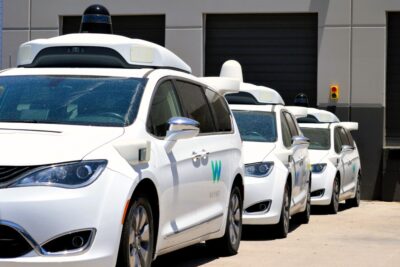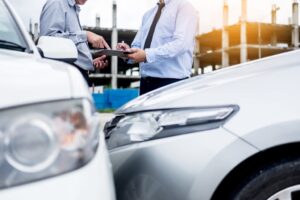
We have been told self-driving cars are the way of the future and much safer than human drivers. However, as autonomous cars from the taxicab company Waymo are coming onto Atlanta streets, you might be wondering what happens in the event of a self-driving taxicab accident.
If you or a loved one was injured in a self-driving car accident with Waymo or another self-driving taxicab company, you need the support of an Atlanta Waymo car accident lawyer. With little precedent in autonomous vehicle crashes, getting the support of a legal team behind you will help in guiding your case to a successful outcome. John Foy & Associates have been fighting and winning cases for Atlanta personal injury clients over the past 25 years.
Waymo Self-Driving Taxicabs
Waymo is a self-driving car technology company created by Alphabet, Inc., the parent company of Google. Their autonomous vehicles have already mapped millions of miles in California and Arizona, and now, Waymo driverless cars have hit Atlanta streets. Due to Georgia legislation regarding autonomous vehicle testing, Waymo vehicles will have a driver behind the wheel, unlike their operations in other states.
These vehicles are designed to replace human drivers by using cameras, sensors, algorithms, and artificial intelligence. Waymo stands out as a pioneer of self-driving technology, but that technology has not been perfected to completely prevent accidents. When these technologies fail, especially in crowded areas like Atlanta, people can get hurt.
Other autonomous vehicle companies like Uber Level 3 autonomous vehicles have been involved in accidents causing injuries and fatalities as well as the Tesla Autopilot feature was involved in 13 fatal crashes. Pursuing a case against these companies and the liable parties ensures that justice is being served and works to prevent accidents in the future. If you or a loved one has been injured in a Waymo car accident, it is important to seek the assistance of an attorney knowledgeable about these types of claims and the intricacies involved in establishing liability.
Get the strong arm
Liability in Waymo Car Accidents
Establishing liability in Waymo car accidents and other self-driving car accidents can be difficult due to the multiple parties that can be held liable. When there is a driver in the car, as will be the case with Waymo vehicles in Atlanta, that person is the first to be held liable, as their actions may have been able to prevent your accident and injuries from occurring. However, Waymo as a company will also be responsible for the negligence that caused the crash, whether it was a malfunctioning or defective part or a programming design that caused the vehicle to crash.
Your self-driving car accident lawyer will work with you to gather evidence to see what exactly caused the crash, which can help you understand more about what parties can be held liable. Possible evidence could include photos of the scene of the accident, medical records, eyewitness testimony, video footage from traffic cameras, any records from cameras or sensors on the Waymo vehicle itself, and accident reports. It can be hard to know how to read a Georgia Uniform Motor Vehicle Accident Report, but your car accident lawyer can help you interpret the important information that can be used in your case.
Georgia was one of the first states to legalize autonomous cars on our public roadways in 2017, which means we have seen our fair share of self-driving car accidents. The good news for anyone who has suffered a personal injury due to self-driving vehicles is that they are required to have more than twice the minimum insurance compared to traditional passenger vehicles under Title 40 of the Official Code of Georgia Annotated. Whether you choose to settle out of court or pursue a personal injury lawsuit, consulting with a lawyer from John Foy & Associates can help you determine who is liable for your Waymo car accident and what your legal options are moving forward.
Types of Automated Vehicles
Under the National Highway Traffic Safety Administration’s automated vehicle safety program, cars, and trucks that have these features are categorized based on six levels of automation. These automated features include braking, acceleration, steering, and navigation. These levels of automated vehicles include:
- Momentary Driver Assistance (Level 0) – the driver is fully in control of the vehicle but will provide assistive warnings and alerts in case of emergency situations. Examples include automatic emergency braking, lane departure warnings, and forward collision alerts.
- Driver Assistance (Level 1) – the driver is fully in control of the vehicle, but the system can assist with maintaining speed (acceleration or braking) or some steering. Examples include adaptive cruise control and lane-keeping assistance.
- Additional Assistance (Level 2) – the driver is still fully responsible for navigation and in control of the vehicle, but the system will perform steering, acceleration, and braking.
- Conditional Automation (Level 3) – currently unavailable to consumers, conditional automation allows the system to handle all aspects of driving while allowing the driver to take over if necessary.
- High Automation (Level 4) – limited to a geofenced area, the system can operate completely as a self-driving vehicle with occupants acting as passengers only. Taxicab companies like Waymo are rolling out high-automation vehicles in limited areas.
- Full Automation (Level 5) – full automation vehicles are still being concept tested, but will not require any human attention, eliminating steering wheels and acceleration/brake pedals. The goal of these will be to be free of any geofencing so they can drive anywhere as an experienced human driver would.
The National Highway Traffic Safety Administration supports the progress of automated vehicles to make roads safer. Eliminating things like human error could greatly reduce car accidents on our roads, but many of these technologies are still going through testing. Failure to brake, speeding, judging distance from other vehicles, and other deficiencies in self-driving cars are still causing accidents where people get hurt.
Contact an Experienced Self-Driving Car Accident Lawyer
John Foy & Associates are committed to supporting Atlanta personal injury clients and have been active in the community for over 20 years. If you are wondering if Waymo can be held liable for your accident, contact us to set up a free consultation to discuss your case. Trust The Strong Arm to fight for justice in your personal injury claim.
404-400-4000 or complete a Free Case Evaluation form





